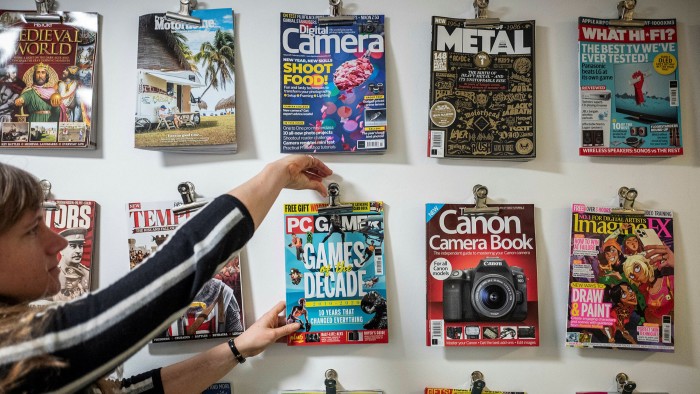Future facing investor anger over proposed £40m CEO bonus scheme

Roula Khalaf, Editor of the FT, selects her favourite stories in this weekly newsletter.
Future, the magazine publisher behind titles including Country Life and Horse & Hound, has come under fire over a proposed bonus scheme that could award its chief executive just over £40m.
Institutional Shareholder Services and Glass Lewis, two influential advisers to many of the world’s biggest asset managers, have recommended that investors vote against the proposed pay package at the group’s upcoming annual meeting on February 10.
Two shareholders have also expressed concern to the Financial Times about the so-called value creation plan, which could pay out up to £95m in stock-based awards annually over three years to employees based on total shareholder return, a metric that includes share price performance and dividends.
Future’s proposal has inflamed shareholder concerns that companies are using the pandemic to introduce bonus policies for management which are potentially very generous. Last month a third of shareholders at Cineworld revolted over a bonus scheme that could award the chain’s chief executive and his deputy up to £65m each in shares.
One top-30 shareholder said Future’s annual meeting next week was set to be “another controversial one”. “Expect significant pushback from shareholders,” he added.
Neville White, head of responsible investments policy and research at EdenTree Investment Management, which has a small stake in Future, said he was concerned about “excessive pay creep” at the company.
The scheme proposes that, as long as the company’s share price goes up by at least 10 per cent a year from September 2020 to September 2025, all employees will be granted shares in three tranches, each capped at £95m. These awards will vest from 2023.
Zillah Byng-Thorne, chief executive, is entitled to 14.3 per cent of this pot, or up to an annual £13.6m. Ms Byng-Thorne, who was paid a total of £3.7m last year, is also set for a salary increase of more than 21 per cent to £575,000.
About a fifth of the pool will be reserved for senior executives, including the chief executive’s share.
Future said it had “consulted closely” with shareholders and that the proposal reflected “constructive feedback”, adding that the majority of the potential bonus would be distributed among its 2,300 employees. A previous scheme only rewarded the 50 most senior directors.
“The proposed plan is directly aligned to shareholder interests . . . the maximum potential award would require the company to create over £4bn of additional shareholder value over the course of the next five years,” it said.
Ms Byng-Thorne took over the once heavily lossmaking company in 2014 and has transformed it, bucking a trend of declining revenues in the print media industry. The publisher was the best performer on the FTSE 350 in 2019 and has snapped up assets worth roughly £1.1bn including rival TI Media and comparison site GoCompare.
Future’s share price rose about 20 per cent last year.
Although it argued that the scheme would be “instrumental in harnessing the very best talent”, ISS said there was “an absence of sufficiently compelling rationale to explain why the existing remuneration arrangements for the [executive directors] are not considered to already offer adequate incentivisation”.
Glass Lewis said it had “severe reservations” about supporting the policy, adding that it could lead to “extremely high payouts to executives based in large part on general economic factors outside of management’s control”.
But one top-30 shareholder offered support, arguing that the 10 per cent share price hurdle was above “typical long-term stock market returns of 6-8 per cent a year” and that there was a “reasonable lock-in” with executives expected to hold the shares until 2025.
Several companies including Informa, SIG, Provident Financial and McBride have proposed co-called value creation or restricted share plans that award executives largely because of share price movements since the pandemic.
Mr White said companies had turned to these schemes as Covid disruption had made other performance metrics difficult to predict but added that “share price escalation is usually not controlled by management”.
Comments